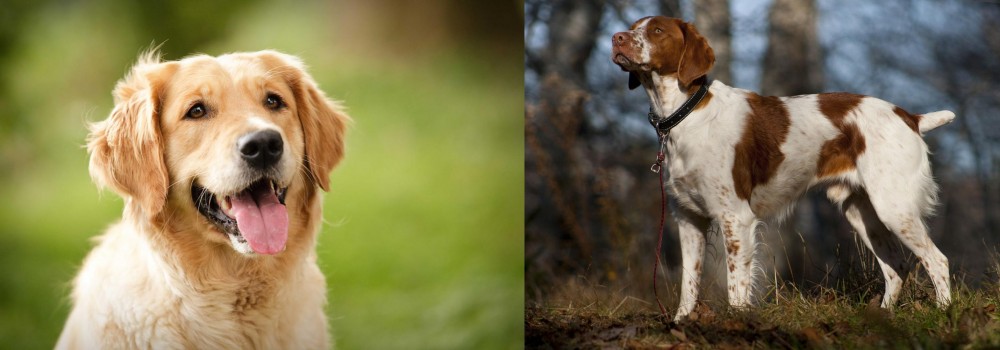 Petzlover
Petzlover Golden Retriever is originated from United Kingdom but Brittany is originated from France. Golden Retriever may grow 9 cm / 4 inches higher than Brittany. Golden Retriever may weigh 16 kg / 36 pounds more than Brittany. Both Golden Retriever and Brittany has almost same life span. Both Golden Retriever and Brittany has almost same litter size. Golden Retriever requires Moderate Maintenance. But Brittany requires Low Maintenance
Golden Retriever is originated from United Kingdom but Brittany is originated from France. Golden Retriever may grow 9 cm / 4 inches higher than Brittany. Golden Retriever may weigh 16 kg / 36 pounds more than Brittany. Both Golden Retriever and Brittany has almost same life span. Both Golden Retriever and Brittany has almost same litter size. Golden Retriever requires Moderate Maintenance. But Brittany requires Low Maintenance
 One of the most intense bird dog breeds in existence is the Brittany, bred for hunt. The breed used to be called the Brittany Spaniel, but since the breed is closer to a setter or pointer, that moniker has been dropped. The Brittany is named for the French Province in which they were originally developed. Sometime from the 17th to the 19th centuries, the breed was developed. Images of a very similar dog can be found on 17th century paintings and tapestries. However, the first written description comes from 1850 by a Reverend Davies, describing a hunting episode. The breed was recognized officially in the early part of the 20th century and made a splash at the 1900 Paris Dog Show.
One of the most intense bird dog breeds in existence is the Brittany, bred for hunt. The breed used to be called the Brittany Spaniel, but since the breed is closer to a setter or pointer, that moniker has been dropped. The Brittany is named for the French Province in which they were originally developed. Sometime from the 17th to the 19th centuries, the breed was developed. Images of a very similar dog can be found on 17th century paintings and tapestries. However, the first written description comes from 1850 by a Reverend Davies, describing a hunting episode. The breed was recognized officially in the early part of the 20th century and made a splash at the 1900 Paris Dog Show.
The first official standards were written in about 1907 and the breed was recognized by the American Kennel Club (AKC) in 1934.The Brittany is expected to point to and then retrieve birds and other small ground game. Because the Brittany both points and retrieves they are known in the U.K. as a Hunt, Point and Retrieve breed or an HPR, and they have more Dual Champions than the rest of the AKC Sporting group.
There are actually two types of Brittanys in the minds of many breeders. There is the “French” Brittany and the “American” Brittany. When the breed arrived in the United States in 1931 they became immensely popular in a short period of time. In 1942 American Breeders began the American Brittany Club, rewriting the French standard to fit the dog they knew. Today there are definitely difference between the two sub-sets that can easily be seen. The French dog is smaller than the American dog. The American dog is a runner pacing ahead of the hunter while the French dog works more closely with their human companions. Another visible difference is that the French accept black spotted Brittanys, while in the United States a black spotted coat is considered a fault. Both sub-sets are known for their willingness to follow human directions, their eagerness for the hunt, and their agility and speed.
Unfortunately, the European wars took their toll on this breed as they did on many others. Following the second World War, their numbers in Europe were drastically reduced. The French had stop breeding them altogether during the war. It was in this depleted gene pool that the French agreed to accept the black spotted Brittany. Along with the U.S., Canada also does not recognize the black spotted Brittany.
 The Golden retriever always gets in the top ten ranking in USA. They are very intelligent and beautiful. Also they are very active and they take more years to mature as they like being silly and playful. Up-to four years they seem to play like a puppy. As the breed is set in for hunting waterfowl and ducks, they need a regular exercise such as walking or running. They love to roam in the yard and run in the beach.
The Golden retriever always gets in the top ten ranking in USA. They are very intelligent and beautiful. Also they are very active and they take more years to mature as they like being silly and playful. Up-to four years they seem to play like a puppy. As the breed is set in for hunting waterfowl and ducks, they need a regular exercise such as walking or running. They love to roam in the yard and run in the beach.
They love to be always with his master and so it will be inside the home. They can be involved in doing regular home activities. Their characteristic is not to be a watchdog, as it barks when a stranger comes and after that they love to make friendship with him. They don't like to spend time alone and hence love to make new friends. When you think of buying a golden retriever puppy you should check whether the breeder is a reputable breeder.They must be well trained for a good result. When bringing it to many different areas they will gain more knowledge and intelligence. The nails can be trimmed at a regular interval which will be good for the foot of your dog.
 The Brittany is much like other hunting dogs – pointers and retrievers – in size and stature. He is solid and strong but not heavy. He is compact with an average size head and floppy ears, docked tails or short natural tails, and expressively intelligent looking eyes. He is athletic, energetic, and alert. He has a long, elastic and free gait. The French dog is smaller and the dog with black spots is accepted. The American Brittany is larger and only a tri-color of orange, liver and white is acceptable.
The Brittany is much like other hunting dogs – pointers and retrievers – in size and stature. He is solid and strong but not heavy. He is compact with an average size head and floppy ears, docked tails or short natural tails, and expressively intelligent looking eyes. He is athletic, energetic, and alert. He has a long, elastic and free gait. The French dog is smaller and the dog with black spots is accepted. The American Brittany is larger and only a tri-color of orange, liver and white is acceptable.
 They love so much to play and spend time with children.
They love so much to play and spend time with children.
The Golden retriever has a good energy which helps them to be a great hunting dog.
They have a high sensitivity level and will enjoy moderate weather. They don't like apartment life as they love to roam freely and explore new areas.
They also have a high intelligence and so learns tricks very quickly. They love to hold something in mouth and run.
 The Brittany is particularly trainable and friendly. They love to play and are sweet-natured. They don’t due well with harsh correction though and a stern look will cause them to wither. Socialize them young or they can become shy around strangers. They are loyal and family oriented. They can easily become attached to their humans.
The Brittany is particularly trainable and friendly. They love to play and are sweet-natured. They don’t due well with harsh correction though and a stern look will cause them to wither. Socialize them young or they can become shy around strangers. They are loyal and family oriented. They can easily become attached to their humans.
 As the golden retriever gains weight very easily, they should not be overfed. They are prone to get cancer, hip dysplasia, heart problems, eye defects and skin allergies.
As the golden retriever gains weight very easily, they should not be overfed. They are prone to get cancer, hip dysplasia, heart problems, eye defects and skin allergies.
The golden retriever sheds hair profusely. The shedding can be reduced by brushing 3 times a week as it will remove the dead hair.Mild shampoo containing omega 3 and omega 6 fatty acids must be used so that it will prevent hair fall and provides healthy skin and fur. The hair can be trimmed but it should not be shaved as the pet will get problems during winter. Adding a drop of olive oil in the dog food will reduce shedding.
 The breed is a hardy one and Brittanys are mostly healthy dogs. In Europe 1 in 5 dogs dies of old age and that age is usually 14 or 15 years. They do have a few issues that they may be susceptible to. These would include:
The breed is a hardy one and Brittanys are mostly healthy dogs. In Europe 1 in 5 dogs dies of old age and that age is usually 14 or 15 years. They do have a few issues that they may be susceptible to. These would include:
 The puppy should be fed 3 times a day and it should be morning 7 and noon and evening within 6. They should not be fed after 6pm and should not be given water after 7pm as to make them a perfect watchdog. Peas, potatoes and flaxseed provide nutrition for them. Chicken fat is good for their skin. Chicory root and chelated minerals are good for their health.
The puppy should be fed 3 times a day and it should be morning 7 and noon and evening within 6. They should not be fed after 6pm and should not be given water after 7pm as to make them a perfect watchdog. Peas, potatoes and flaxseed provide nutrition for them. Chicken fat is good for their skin. Chicory root and chelated minerals are good for their health.
The Golden retriever can be fed by normal nutritious and proteins content food as they will gain much energy for them.
As the golden retriever has chances of getting bone problems they should not overfed.
They are having high energy levels and hence they require playing for 2 hours daily. The breed was set in for sporting and hunting and so it likes to play, run and jog.
 Don’t overfeed your Brittany. Keep him at hunting weight by feeding a half a cup up to 2 cups per day depending on the size of your dog and activity levels. Serve this in two meals not one.
Don’t overfeed your Brittany. Keep him at hunting weight by feeding a half a cup up to 2 cups per day depending on the size of your dog and activity levels. Serve this in two meals not one.
Ears – prone to infections – make sure that you check them and wipe them out routinely to prevent infections.
Hip Dysplasia – bones don’t fit well into joints – this can be genetic or otherwise, causing lameness and arthritis. If severe it can require surgery to correct.
Epilepsy – mild or serious seizures are possible. This can be genetic/hereditary but is set off by an infectious disease of the brain, head injury, poison, tumor, or metabolic disorder. There is no cure, but medication can be very effective.
Hypothyroidism – Low levels of thyroid hormone – can cause drooping eyelids, obesity, lethargy, mental difficulties or irregular heat cycles or all of this. Medication is available as it is for humans but must be taken daily for the rest of the dog’s life
Canine Discoid Lupus Erythematosus – autoimmune disease that is rare in dogs. Cats and humans can also have it. It is a skin disease and does not become the more serious and deadly Systemic Lupus. The Discoid version of this disease causes loss of pigmentation and a scaling on the nose which can then progress to the skin around the ears, eyes and genitals. There could be ulcerated lesions and tissue death in more severe cases. Sun exposure can make the condition worse.
The Brittany is a hunting dog that acts like a pointer but will retrieve fowl and birds in the water or on land. If you don’t hunt, the Brittany can still be your family dog. They need lots of exercise and mental stimulation. They need a job if they are not going to hunt and expect them to be distracted by every bird they see. Try flyball, agility, FAST CAT, field trials and dock diving. They are very task oriented and have boundless energy. They excel at obedience and confirmation as well.